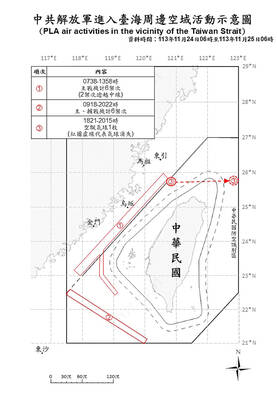The navy will get the lion's share of the armaments procurement budget for the next five years, according to a five-year military buildup plan submitted to the Legislative Yuan by the Ministry of National Defense on Thursday.
The report says the military will spend NT$605.2 billion (US$17.9 billion) on arms procurement over the next five years, with the navy taking the biggest slice -- NT$98.8 billion. If the special budget for procurement of eight conventional submarines is factored into the equation, the navy's armaments purchase budget will hit its highest level since the 1980s.
According to the ministry report, the military will reduce the total number of servicemen by 45,000 over the next three years. As a result, the report says, the personnel costs will drop NT$5 billion in 2004, NT$6 billion in 2005 and another NT$6 billion in 2006. The military's annual personnel costs will then be kept at NT$120.7 billion per year.
The report estimates the military's total personnel costs for the next five years at NT$621.5 billion, accounting for 48.66 percent of the nation's total defense budget for the period.
According to the report, the air force will obtain the largest share of the total defense budget for the next five years at 24.55 percent, followed by the navy at 23.76 percent and the army at 18.92 percent.
In terms of arms procurement, the lion's share of the budget will be spent on information and electronic warfare equipment, accounting for 28 percent of the total. Air-combat weaponry systems will account for 18 percent of the budget; naval combat equipment, 14 percent; surface defense equipment, 12 percent; and educational training equipment, 3 percent.
The report also says the military will step up research and development of various types of guided missiles, anti-tank weapons and gunships, as well as unmanned aircraft and cutting edge nanotechnology and superconductivity defense technology.
The military will also strive to maintain supremacy in electronic warfare technology and to build up a comprehensive C4ISR architecture, the report says. Another priority is the establishment of an anti-submarine combat system and a coastal anti-submarine command center.

Taiwan’s passport ranked 34th in the world, with access to 141 visa-free destinations, according to the latest update to the Henley Passport Index released today. The index put together by Henley & Partners ranks 199 passports globally based on the number of destinations holders can access without a visa out of 227, and is updated monthly. The 141 visa-free destinations for Taiwanese passport holders are a slight decrease from last year, when holders had access to 145 destinations. Botswana and Columbia are among the countries that have recently ended visa-free status for Taiwanese after “bowing to pressure from the Chinese government,” the Ministry

Theaters and institutions in Taiwan have received 28 threatening e-mails, including bomb threats, since a documentary critical of China began being screened across the nation last month, the National Security Bureau said yesterday. The actions are part of China’s attempts to undermine Taiwan’s sovereignty, it said. State Organs (國有器官) documents allegations that Chinese government officials engage in organ harvesting and other illegal activities. From last month to Friday last week, 28 incidents have been reported of theaters or institutions receiving threats, including bomb and shooting threats, if they did not stop showing the documentary, the bureau said. Although the threats were not carried out,

HEALTHCARE: Following a 2022 Constitutional Court ruling, Taiwanese traveling overseas for six months would no longer be able to suspend their insurance Measures allowing people to suspend National Health Insurance (NHI) services if they plan to leave the country for six months would be abolished starting Dec. 23, NHIA Director-General Shih Chung-liang (石崇良) said yesterday. The decision followed the Constitutional Court’s ruling in 2022 that the regulation was unconstitutional and that it would invalidate the regulation automatically unless the NHIA amended it to conform with the Constitution. The agency would amend the regulations to remove the articles and sections that allow the suspension of NHI services, and also introduce provisional clauses for those who suspended their NHI services before Dec. 23, Shih said. According to

‘GRAY ZONE’ TACTICS: China continues to build up its military capacity while regularly deploying jets and warships around Taiwan, with the latest balloon spotted on Sunday The US is drawing up contingency plans for military deployments in Japan and the Philippines in case of a Taiwan emergency, Japan’s Kyodo news agency reported. They would be incorporated in a first joint operation plan to be formulated in December, Kyodo reported late on Sunday, citing sources familiar with Japan-US relations. A US Marine Corps regiment that possesses High Mobility Artillery Rocket Systems — a light multiple rocket launcher — would be deployed along the Nansei Island chain stretching from Kyushu to Yonaguni near Taiwan, Kyodo said. According to US military guidelines for dispatching marines in small formations to several locations,